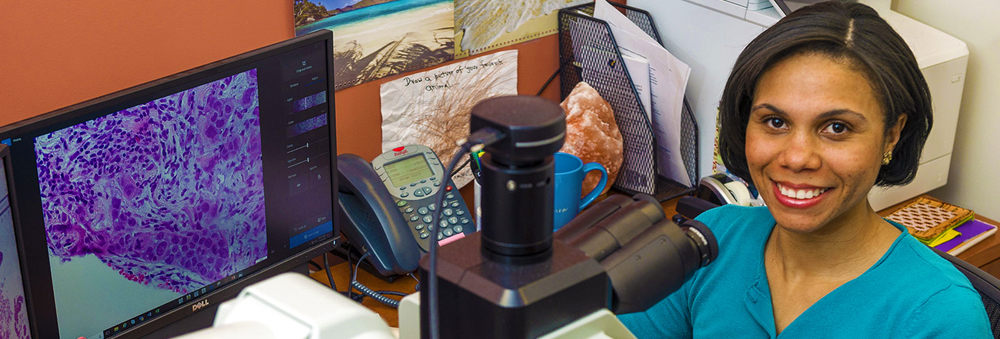So you want to learn what a Pathologist does?
A pathologist with MD training is a medical doctor who specializes in the diagnosis of human disease. They can work in various settings, including academic teaching hospitals, private practice, government, industry, etc. Pathologists can pursue a wide spectrum of different careers:
- Anatomic pathologist: evaluates tissue specimens (brain, heart, lungs, bones, etc.). Uses a microscope to examine prepared specimens.
- Clinical pathologist: evaluates blood, urine, and other non-tissue specimens. Sets guidelines for blood transfusion practice.
- Forensic pathologist: evaluates evidence to establish causes of death, particularly wrongful death; may be a medical examiner.
Videos about what is Pathology and how a Pathologist plays a role in patient care
- Link for VSP e-lecture careers in path
- College of American Pathologists video (2 min): What is Pathology?
- University of Michigan, Path on the Street (7 min): What does a Pathologist do?
- Dr. Raga Ramachandran (6 min): Pathology and Patient Care
Pathology faculty lead cutting-edge, impactful research.
There are opportunities for JHU medical students to pursue MS1 Scholarly Concentration projects with Pathology faculty. Browse these lab websites below:
- http://pathology.jhu.edu/department/divisions/rLabs.cfm
- Current Projects for Medical Students interested in Pathology research (Scholarly Concentration)
Pathology may be the field for you if:
- You enjoy anatomy and physiology.
- You are a visual person and have good attention to detail.
- You prefer to work in a lab behind a microscope or in a microbiology lab or blood bank.
- You are drawn to the scientific, analytical, technical aspects of medicine.
- You enjoy solving mysteries or finding answers to the unknown.
- You are a team-player and enjoy working with other pathologists, surgeons, and clinicians.
- You have good written and oral communication skills (to communicate challenging and nuanced diagnoses to clinical colleagues, or discuss an autopsy with a call to a patient or family of a deceased one)
- You have compassion for patients.

